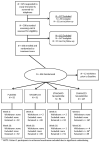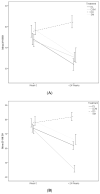The Effects of Vitamin D-Enriched Mushrooms and Vitamin D3 on Cognitive Performance and Mood in Healthy Elderly Adults: A Randomised, Double-Blinded, Placebo-Controlled Trial
- PMID: 33339304
- PMCID: PMC7766163
- DOI: 10.3390/nu12123847
The Effects of Vitamin D-Enriched Mushrooms and Vitamin D3 on Cognitive Performance and Mood in Healthy Elderly Adults: A Randomised, Double-Blinded, Placebo-Controlled Trial
Abstract
Despite abundant cross-sectional evidence that low vitamin D status is associated with risk of cognitive decline in ageing, interventional evidence for benefits of vitamin D supplementation is lacking. This study was a 6 month randomised, double-blinded placebo-controlled clinical trial of the effects of vitamin D3 (D3), enhanced vitamin D2 in a mushroom matrix (D2M), standard mushroom (SM) and placebo (PL) on cognition and mood in n = 436 healthy older male (49%) and female volunteers aged ≥ 60 years. Primary end points were change in serum vitamin D metabolites (25-OH-D, 25-OH-D2 and 25-OH-D3), cognitive performance, and mood over 24 weeks. Levels of total 25-OH-D and 25-OH-D3 were maintained in the D3 arm but decreased significantly (p < 0.05) in the remaining arms (D2M, SM and PL). Analysis also revealed differential changes in these metabolites depending on total vitamin D status at baseline. There were no significant effects of treatment on any of the measures of cognitive function or mood. Overall, the results show that daily supplementation of ~600 IU of vitamin D3 was sufficient to maintain 25-OH-D throughout winter months, but in contrast to existing cross-sectional studies there was no support for benefit of vitamin D supplementation for mood or cognition in healthy elderly people.
Keywords: cognitive function; mood; mushroom; vitamin D.
Conflict of interest statement
The authors declare no conflict of interest.
Figures




Similar articles
-
Assessing the impact of a mushroom-derived food ingredient on vitamin D levels in healthy volunteers.J Int Soc Sports Nutr. 2020 Nov 11;17(1):54. doi: 10.1186/s12970-020-00387-0. J Int Soc Sports Nutr. 2020. PMID: 33176826 Free PMC article. Clinical Trial.
-
Long-term vitamin D3 supplementation is more effective than vitamin D2 in maintaining serum 25-hydroxyvitamin D status over the winter months.Br J Nutr. 2013 Mar 28;109(6):1082-8. doi: 10.1017/S0007114512002851. Epub 2012 Jul 11. Br J Nutr. 2013. PMID: 23168298 Clinical Trial.
-
Fortified malted milk drinks containing low-dose ergocalciferol and cholecalciferol do not differ in their capacity to raise serum 25-hydroxyvitamin D concentrations in healthy men and women not exposed to UV-B.J Nutr. 2012 Jul;142(7):1286-90. doi: 10.3945/jn.111.156166. Epub 2012 May 23. J Nutr. 2012. PMID: 22623396 Clinical Trial.
-
25(OH)D3-enriched or fortified foods are more efficient at tackling inadequate vitamin D status than vitamin D3.Proc Nutr Soc. 2018 Aug;77(3):282-291. doi: 10.1017/S0029665117004062. Epub 2017 Nov 27. Proc Nutr Soc. 2018. PMID: 29173203 Free PMC article. Review.
-
Effects of vitamin D3 supplementation on serum 25(OH)D concentration and strength in athletes: a systematic review and meta-analysis of randomized controlled trials.J Int Soc Sports Nutr. 2019 Nov 26;16(1):55. doi: 10.1186/s12970-019-0323-6. J Int Soc Sports Nutr. 2019. PMID: 31771586 Free PMC article.
Cited by
-
Mushrooms: a food-based solution to vitamin D deficiency to include in dietary guidelines.Front Nutr. 2024 Apr 10;11:1384273. doi: 10.3389/fnut.2024.1384273. eCollection 2024. Front Nutr. 2024. PMID: 38660061 Free PMC article.
-
The Role of Vitamin D in the Management of Major Depressive Disorder: A Systematic Review.Pharmaceuticals (Basel). 2025 May 25;18(6):792. doi: 10.3390/ph18060792. Pharmaceuticals (Basel). 2025. PMID: 40573189 Free PMC article. Review.
-
Vitamin D supplementation for depression in older adults: a meta-analysis of randomized controlled trials.Front Nutr. 2023 Jun 21;10:1169436. doi: 10.3389/fnut.2023.1169436. eCollection 2023. Front Nutr. 2023. PMID: 37415914 Free PMC article.
-
Safety of vitamin D2 mushroom powder as a Novel food pursuant to Regulation (EU) 2015/2283 (NF 2020/2226).EFSA J. 2024 Jun 12;22(6):e8817. doi: 10.2903/j.efsa.2024.8817. eCollection 2024 Jun. EFSA J. 2024. PMID: 38868108 Free PMC article.
-
Efficacy of vitamin D supplementation on depressive symptoms in older patients: a meta-analysis of randomized controlled trials.Front Med (Lausanne). 2024 Oct 10;11:1467234. doi: 10.3389/fmed.2024.1467234. eCollection 2024. Front Med (Lausanne). 2024. PMID: 39450108 Free PMC article.
References
-
- Salthouse T.A. What and When of Cognitive Aging. Curr. Dir. Psychol. Sci. 2004;13:140–144. doi: 10.1111/j.0963-7214.2004.00293.x. - DOI
-
- Dark-Freudeman A., West R.L., Viverito K.M. Future Selves and Aging: Older Adults’ Memory Fears. Educ. Gerontol. 2006;32:85–109. doi: 10.1080/03601270500388125. - DOI
Publication types
MeSH terms
Substances
LinkOut - more resources
Full Text Sources
Medical

